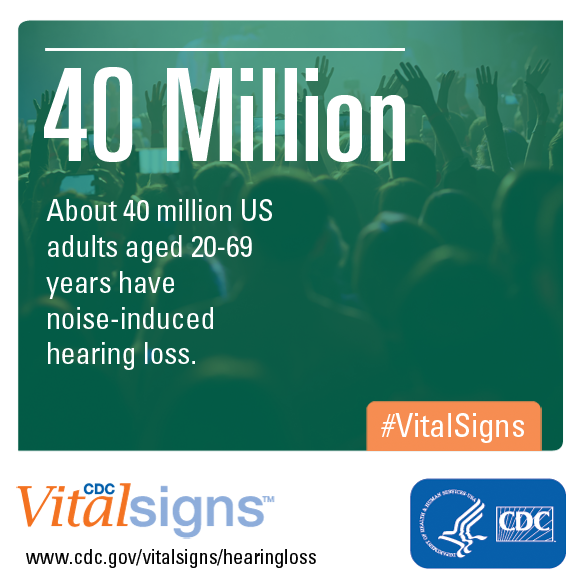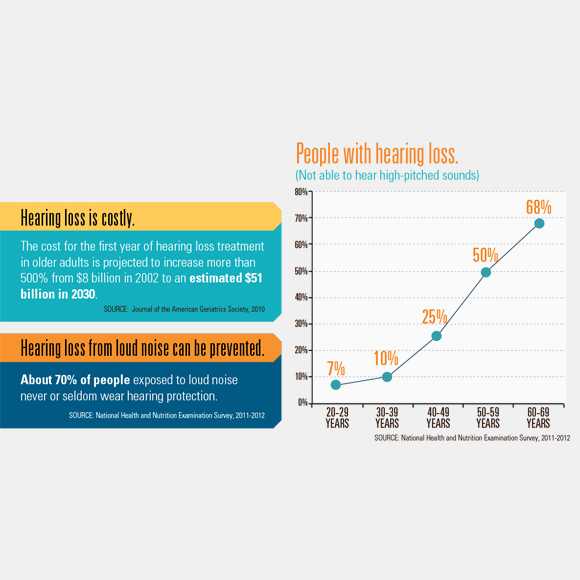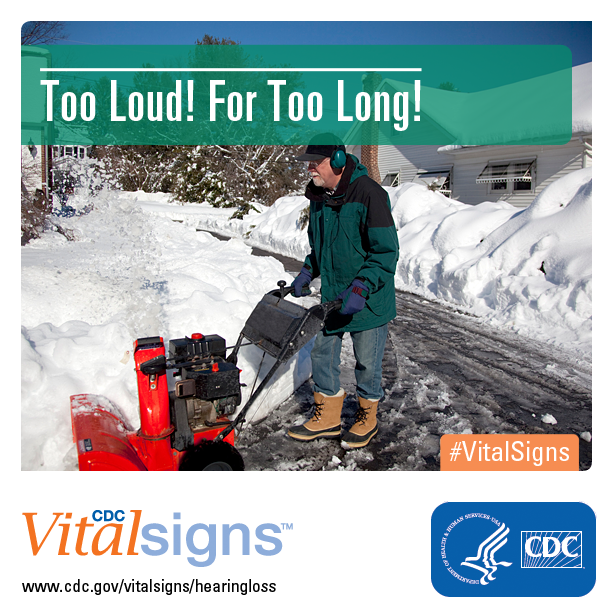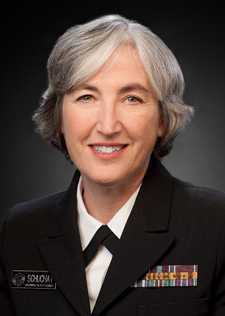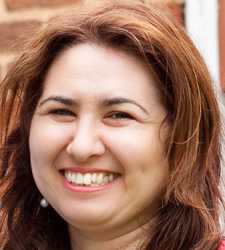Non-occupational Noise-induced Hearing Loss
Loud noises damage hearing
This website is archived for historical purposes and is no longer being maintained or updated.
It’s hard to know when your hearing is damaged, unless you have a hearing test. About 1 out of 4 US adults who report excellent to good hearing already have hearing damage. A new CDC Vital Signs report finds that many of those with hearing damage report no workplace noise exposure.
About 40 million US adults aged 20-69 have hearing damage in one or both ears that may be due to noise exposure. CDC found that more half of those (53%) report no exposure to loud noise at work. Based on the information they provided, researchers believe their exposure to loud sounds comes from everyday activities in their homes and communities.
Noise exposure is the second most common cause of hearing loss. (Aging is first.) The louder a sound is and the more often a person is exposed to it, the more likely it will damage hearing. Common activities in homes and communities—such as using gas-powered lawnmowers or leaf blowers or attending a rock concert or ball game—can cause permanent hearing loss. Once hearing is gone, it’s gone forever.
Noise-induced hearing loss is a concern not only because it makes conversation and other daily activities more difficult, but also because it causes many other health problems. Exposure to noise causes stress, anxiety, depression, high blood pressure, and heart disease.
Even though noise is all around us, much hearing loss from noise is preventable. And the steps to protect the ears and preserve hearing are relatively simple and don’t cost much.
- Avoid noisy places whenever possible.
- If you must be in a noisy environment, step away from the sound source, and try to minimize the amount of time spent there.
- Use earplugs, as a convenient, low-cost form of protection. Or use protective ear muffs or noise-canceling headphones.
- At home and in the car, keep the volume down. And even though the evidence is mixed about using earbuds or headphones for listening, it’s still smart to keep the volume down and take breaks from listening.
- People who know they’ve been exposed to loud noise, or who are concerned that they aren’t hearing as well as they used to can ask their doctors for a hearing checkup.
Clinicians, especially primary care providers, can play an important role in identifying hearing in its early stages. Doctors, nurses, and other health professionals can ask patients about exposure to loud noise and trouble hearing during routine exams. When patients show or report hearing problems, healthcare providers can make referrals to hearing specialists. And they can explain how noise exposure permanently damages hearing and counsel patients in how to protect their hearing.
For more information about noise-induced hearing loss at home and in the community, visit https://www.cdc.gov/nceh/hearing_loss/default.html.
Contact Information
CDC Media Relations
(404) 639-3286
media@cdc.gov
Vital Signs Links
Factsheet:
English [1.99MB]
Spanish [2.02MB]
Spokespersons
Anne Schuchat, MD
“40 million Americans show some hearing damage from loud noise, with nearly 21 million reporting no exposure to loud noise at work. This can be distressing for people affected and their loved ones. We hope this report will help raise awareness of this problem and help clinicians reduce their patients’ risk for early hearing loss.”
Anne Schuchat, MD – Principal Deputy Director of Centers for Disease Control and Prevention; Rear Admiral, U.S. Public Health Service; EIS Officer, Class of 1988
Yulia Carroll, M.D., Ph.D.
“Hearing damage often occurs before a person realizes it. If you often participate in loud activities or events, if your friends or family complain how loud is the TV or music you listen to, talk to your doctor. And in the meantime, take steps to protect your hearing from loud sounds”
Yulia Carroll, M.D., Ph.D. - Senior Medical Officer, CDC’s National Center for Environmental Health and ATSDR
Related Links
Most Relevant
- Press Release: New Vital Signs study finds noise-related hearing loss not limited to work exposure – English | Spanish
- MMWR – Vital Signs: Noise-Induced Hearing Loss Among Adults — United States 2011–2012
- Vital Signs: Home | February 2017 Vital Signs | Fact Sheet [PDF 1.99MB, 4 pages] | Topics
- Vital Signs: (Spanish) Home | 2017 Febrero – Signos Vitales | Fact Sheet [PDF 2.02MB, 4 pages] | Topics
CDC Related Links
- CDC: National Institute for Occupational Safety and Health. Noise and Hearing Loss Prevention
- CDC: Center on Birth Defects and Developmental Disabilities. Hearing Loss in Children.
- CDC: Environmental Noise Exposure and Health
- CDC: What is Hearing Loss?
- CDC: Environmental Noise Sources
- CDC: Adverse Health Effects from Noise
- CDC: Public Health Burden from Noise and Hearing Loss
- CDC: How do I know if I have hearing loss caused by loud noise?
- CDC: What if I Already Have Hearing Loss?
- CDC: Recommendations and Guidelines
- CDC: Additional Resources
- CDC: Environmental Noise Exposure and Health—References
Additional Resources
Professional Associations and Advocacy Groups
- American Academy of Audiology. Provides consumer and professional resources related to hearing care.
- American Academy of Family Physicians. Provides consumer and professional resources related to hearing loss.
- American Academy of Otolaryngology-Head & Neck Surgery. Provides both consumer and professional information relating to hearing health and treatments for hearing loss.
- American Academy of Pediatrics. Provides consumer and professional resources related to hearing loss and child health and development.
-
American Speech-Language-Hearing Association (ASHA). Provides information about communication and communication disorders.
- Listen To Your Buds. This is an ASHA public education campaign to help children and parents follow safe listening habits when using personal audio devices.
- American Tinnitus Association. Provides information about tinnitus and ways to manage it.
-
Dangerous Decibels. This is a public health campaign to prevent noise-induced hearing loss.
- Dangerous Decibels Educator Resource Guide. This is a self-study and other teaching materials on noise induced hearing loss.
- Directors of Speech and Hearing Programs in State Health and Welfare Agencies (DSHPSHWA). Provides professional support for leaders of speech and hearing programs in the United States.
- Hearing Education and Awareness for Rockers. This non-profit group educates young people, musicians, and others about the dangers of exposure to loud music.
- Hearing Health Foundation. The foundation awards grants for research to prevent and cure hearing loss.
- Hearing Loss Association of America. Provides assistance and resources for people with hearing loss and their families.
- Hyperacusis Research. Provides information about sound sensitivities (hyperacusis) and information sources to manage it.
- Listen for Life: Noise-Induced Hearing Loss Prevention. This CDC-funded project presents a community-wide, culturally-acceptable and sustainable hearing loss prevention campaign to Native communities in the Northwest.
- National Hearing Conservation Association Its mission is to prevent hearing loss due to noise and other environmental factors in all sectors of society
- Noise Pollution Clearinghouse. This non-profit organization has extensive online noise related resources.
- Sight and Hearing Association. This non-profit organization works towards the early detection of preventable loss of vision and hearing.
- The Quiet Coalition. Provides a platform for communication, programs, and coordinated action for science, health, and legal professionals concerned about the impacts of noise on health.
Intervention and Family Support Services
- Better Hearing Institute . Provides information on hearing loss, tinnitus, and hearing aids. It also has a directory of hearing care providers (audiologists, hearing instrument specialists, and otolaryngologists).
- Council on Education of the Deaf. Provides information and resources for parents and persons involved in deaf education.
- EHDI-PALS, Early Hearing Detection & Intervention – Pediatric Audiology Links to Services. A national web-based directory of facilities that offer pediatric audiology services to young children who are younger than five years of age.
Multimedia
Video
- Too loud for too long: Loud noises damage hearing. Vital Signs February 2017
- Vital Signs hearing loss video
Podcast
- Vital Signs – Too Loud! For Too Long! – English | Spanish
- Vital Signs – Too Loud! For Too Long! – [PSA – 0:60 seconds]
- Page last reviewed: February 7, 2017 (archived document)
- Content source:



 ShareCompartir
ShareCompartir


